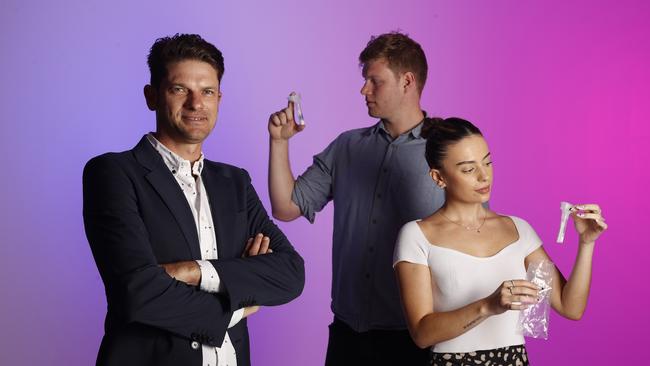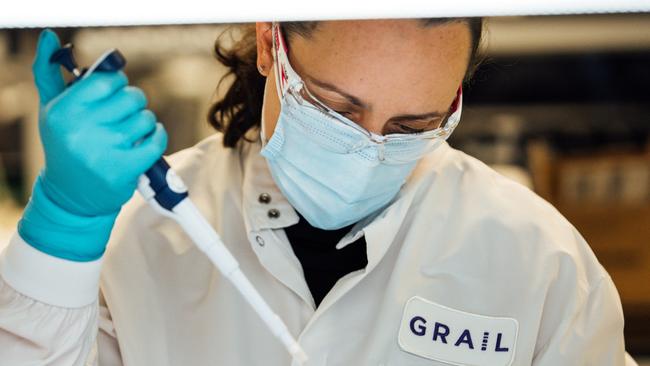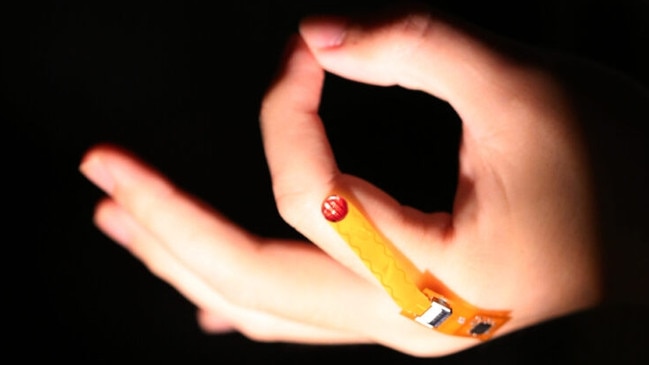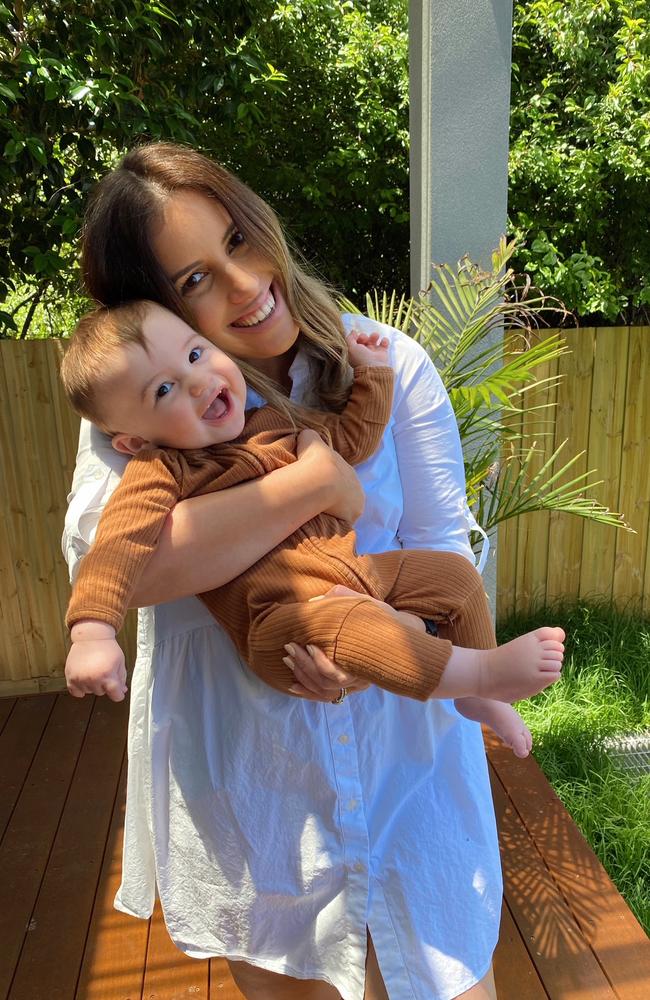Groundbreaking new medical tests prevent cancer and heart disease
Breakthrough DIY medical tests and technology are about to change the way we get medical help. See what’s coming.
National
Don't miss out on the headlines from National. Followed categories will be added to My News.
Exclusive: Do-it-yourself Covid testing is just the start of a revolution in healthcare diagnostics set to transform the way medicine is practised.
Smart watches are already able to collect information on a person’s heart rate, blood pressure, respiratory rate and can even perform an ECG to detect heart problems.
From July 2022, Australian women will be able to avoid the dreaded pap smear and perform their own cervical cancer screening using a self-test kit.
Here, medical correspondent SUE DUNLEVY looks at other breakthrough tests being developed to detect common illnesses.
SMARTPHONE DIAGNOSTICS
Doctors can now carry out ultrasounds anywhere, anytime using a smart phone or tablet via the Butterfly IQ system.
The ultrasound probe plugs directly into the charging slot on the phone or tablet and the images appear on the screen. It can take cardiac images as well as vascular, lung and abdominal pictures.
Smartphones can also track your heart rate and notify you if it becomes irregular, they can measure your blood oxygen levels (although there is debate about the accuracy of this measurement) and cardio fitness — and the Apple watch can even perform a basic electrocardiogram (ECG).
Apple is reportedly working on new tools that will alert users when their blood pressure is increasing and a thermometer to help with fertility planning.

DNA SCREENING
From July 2022, Monash University researcher Associate Professor Paul Lacaze will be offering free preventive genetic testing to 10,000 young adults.
The pilot program will determine if they carry genes that put them at risk of certain preventable cancers and heart disease.
The national study called ‘DNA Screen’ will be open to all Australians aged 18-40, via the study website.
The pilot study could lead to the development of a new low cost ($200 per test) nationwide adult DNA screening program. It will test for the BRCA 1 and 2 genes that predispose people to breast and ovarian cancer.
It will also check for genes for Lynch Syndrome which predispose people to bowel cancer, endometrial and other cancers.
Lastly it will look for the genes behind familial hypercholesterolaemia — genetic high cholesterol — that places people at risk of heart disease.
“One in 50 to one in 75 people are going to be high risk of one of those three conditions,” said Assoc. Prof. Lacaze.
If people know they are at risk they can take preventive action.
Women with BRCA genes can almost eliminate their risk of breast and ovarian cancer by having a mastectomy or hysterectomy, or they could have regular screening.
Those with Lynch Syndrome should have yearly colonoscopies and people with hypercholesterolaemia should be using cholesterol-lowering medications.
Krystal Bater from breast cancer group Pink Hope said a population screening program was essential.
“You’ve got so many people who carry this gene mutation that don’t have family health history to run off and the majority of people that I’ve ever seen with stage four cancer have inherited a BRCA from their father, or don’t have that kind of traditional breast cancer family like mine,” she said.

CANCER BLOOD TESTS
A new blood test that can detect 51 cancers before any symptoms appear has been developed in the UK.
When trialled on people who already had cancer, the Galleri test — created by the company GRAIL — detected cancer in more than half (51.5 per cent) of those with the disease and could predict the location of the tumour 89 per cent of the time.
It was found to be accurate at detecting a range of different tumours at early stages.
It is currently being tested by the UK’s National Health System on 140,000 patients aged 50-77.
If the results are positive the trial will be expanded to more than a million people in 2024. It has a false positive rate of 0.5 per cent, which means if 200 people are tested one person would be given a positive result when they did not have cancer.
It works by checking for tumour-derived cell free DNA in the blood.
Exact Sciences, Guardant Health, Natera, Freenome, Singlera Genomics and Harbinger Health are also developing blood tests for cancer.
Blood, urine and poo tests are also being developed to detect brain, bladder, ovarian and lung cancers. A sponge on a string is being used to test for Oesophageal cancer.
BOWEL CANCER CAPSULE
The National Health Service in the UK last year began clinical trials of a colon capsule to check for bowel cancer and other stomach problems.
Patients swallow a tiny camera the size of a vitamin pill which travels through the bowel taking thousands of pictures that are sent wirelessly to a digital recording device the patient wears like a handbag.
Doctors later view the images to check for cancer.
The capsule is eventually passed out of the body through a bowel movement.
HEALTHY GENES
The Garvan Institute has developed a Medical Genome Reference Bank (MGRB) that has uncovered the genes that will make you healthy and able to live a long life.
It will allow the genetic data of sick people to be compared against the data from the 4000 people aged over 70 who have never developed cancer, heart disease or dementia.
“Effectively we have got a baseline measure of healthy internal or biological ageing,” Garvan Institute researcher Professor David Thomas said.
The data bank will allow them to dismiss genetic changes they know are consistent with healthy ageing when they are searching for gene variants that might cause disease.
PREGNANCY GENETIC TESTING
The Mackenzie’s Mission program is giving 10,000 couples across Australia who are planning to have a baby the chance to get screened to see if they are likely to have a child with a severe genetic condition.
Monash IVF has also launched a new at-home genetic screening test, which can be used by anyone planning a pregnancy or who is already pregnant, to scour for 400 plus genetic conditions.
You don’t have to be a Monash IVF patient to use it and it can be ordered online and used in the comfort of your own home.

WEARABLE WOUND SENSOR
A new gel-based electronic wearable sensor that can identify infections in open wounds before they become obvious to the naked eye.
The device, which is the length of a human finger, attaches directly to an open wound, is worn under the bandage and senses an enzyme called deoxyribonuclease which is secreted by harmful bacteria.
By detecting infections quickly it could head of life-threatening illnesses that can lead to people having their infected limbs amputated.
ASTRONAUTS’ HEALTH STATUS
University of South Australia’s Associate Professor Craig Priest is partnering with NASA to build a ‘laboratory on a chip’, creating a device that astronauts could wear showing their health from a tiny amount of bodily fluid, such as sweat or saliva.
The device would avoid the need for needles or taking blood.
One day they could be incorporated into smart watches.
GENETIC TEST SAVED MUM AND SISTER
Mel Maizels knows first-hand how early genetic testing can save lives.
When her mother developed ovarian cancer at age 50, a genetic investigation revealed she carried the BRCA1 gene that increases the risk of breast and ovarian cancer.
That meant there was a 50 per cent chance Mel and her sister Carni were also at risk — and testing confirmed it.
“Knowledge is power,” 31-year-old Mel, who works as a social media co-ordinator, said.
The sisters took advantage of a free annual MRI screening program for people with the gene mutation.
The second such scan showed her sister had developed a tiny breast cancer at age 24.
“They found a little lump in her breast which she would have never found because she was only honestly 24 and would have never felt it, it was really small,” Mel said.

Her mother’s ovarian cancer was also caught early because she was having regular check-ups due to the large number of female relatives who had died of or been diagnosed with cancer.
All three women have had double mastectomies to almost eliminate their risk of breast cancer.
Her mother has had a hysterectomy and both sisters plan to do the same once they have finished having children.
Mel understands some people may not want to know they are living with a high risk of cancer but she is “all for” people having the option of early population-wide genetic screening.
“It’s given our family options, you can put things in place to prevent an early death or disease and it makes a huge difference,” she said.





